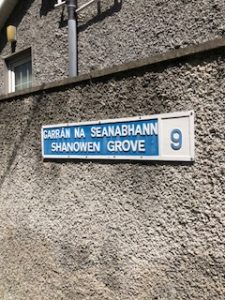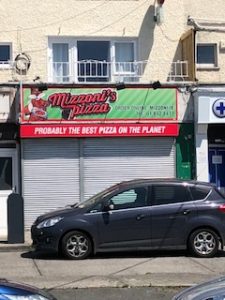Dublin is a multi-cultural city, and therefore, it is a multi-lingual city. Walking down the street, you will hear every language you can possibly imagine before you have made it a couple of blocks. However, one language you will likely not hear is Irish, also known as Gaelic, the country’s native tongue and one that only has about 100,000 native speakers left. While Irish is not spoken as a first language by many people, all of the street signs and public announcements are written in both English and Irish. Like the urban planners of Washington DC’s Chinatown, the Irish government has taken a strong initiative to preserve Irish heritage and culture, and one of the ways they are doing this is keeping the Irish language alive and launching programs to encourage its growth.

This gives Dublin a unique sense of being steeped in its heritage. By maintaining the Irish language through its use in everyday things, like the names of bus stops, the city exudes a feeling of Irish-ness and a connection to the country’s cultural past. While you may not hear Irish being spoken in conversation, there are Irish words that have been adapted into the English that is spoken here, either as slang or as terms of speech. One such word is “craic,” which is used commonly not only in conversation but also in advertisements and on television programs. The word is used to mean fun. The reasoning behind the proliferation of the Irish language here is not only to preserve Irish heritage, but also to fight back against English influence. For many years, Ireland was ruled by England, and during the English occupation, Irish cultural symbols, like river-dancing or the Irish language, were banned. When Ireland gained its independence, bringing back the Irish language was seen as not only a way to keep the Irish identity alive, but also to resist the dominance that the English had had in the country for so long.
While English is the primary language here, Irish grammar and structure actually influences the way in which people speak English and the way that sentences are constructed. There is mutual intelligibility between and English speaker from Ireland and an English speaker from the United States, but some things may be said differently by an Irishman than an American. From what I have read about the grammar, Irish as a language reflects how Irish people generally behave; it is indirect and chooses to dance around a topic as opposed to getting to the heart of the matter. For instance, a pizza shop in the United States attempting to advertise it’s quality might say: “The best pizza in Chicago!” or “The best pizza in the world!” In Dublin, you can find multiple pizza shops (or restaurants more generally) that say “Probably the best pizza in Dublin!” or “Probably the coldest pints of Guinness!”

This is a small example, but reflects the influence that the Irish language still has on the way people speak and the culture of Dublin. Language is a massively important thing, and it is one of the ways in which Dublin is able to maintain its cultural identity in an increasingly globalized world. Much like Chinese language signs in Chinatown, Irish language signs serve as a “claim to the territory” and a manifestation of Irish presence. (Leeman, 343.) The city is a rich ethnic tapestry of people from all over speaking every imaginable language, but it is the Irish language that still remains as a reminder of the country’s past, present, and future.

I’ve noticed that Irish people, in talking, tend to work around the point too! I wonder whether that’s a function of their culture, or something that also draws from the formatting of the Irish language.
On Grafton Street there’s a cigar shop called “Decent Cigars Emporium.” It’s debatable whether the cigars or the emporium is what’s just decent, but nonetheless, the store is giving it to you straight. I’ve seen Mizzoni’s Pizza everywhere, but I wish I’d seen the one that boasts it’s “probably the best pizza on the planet.” In someways I think the Irish don’t like to talk to highly of anything, especially themselves. They’re never going to over sell you on anything.